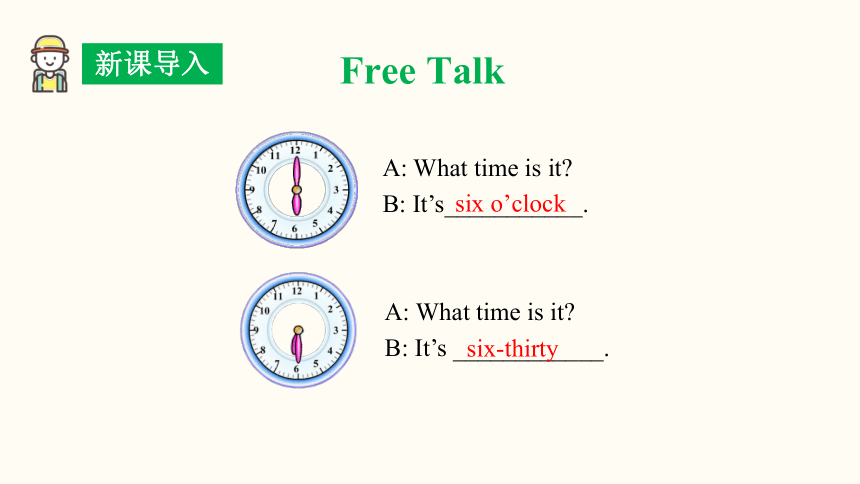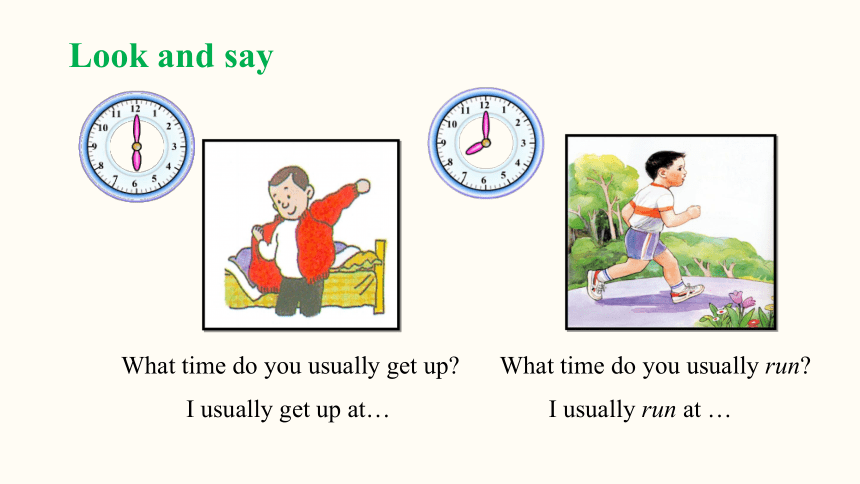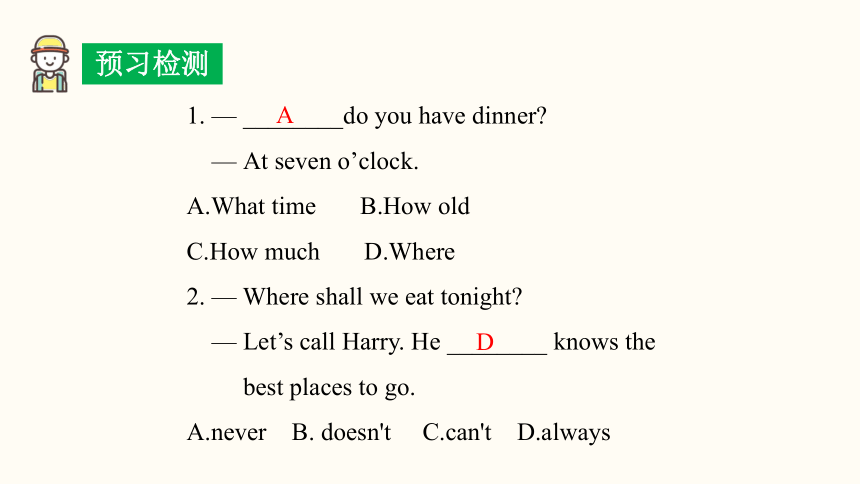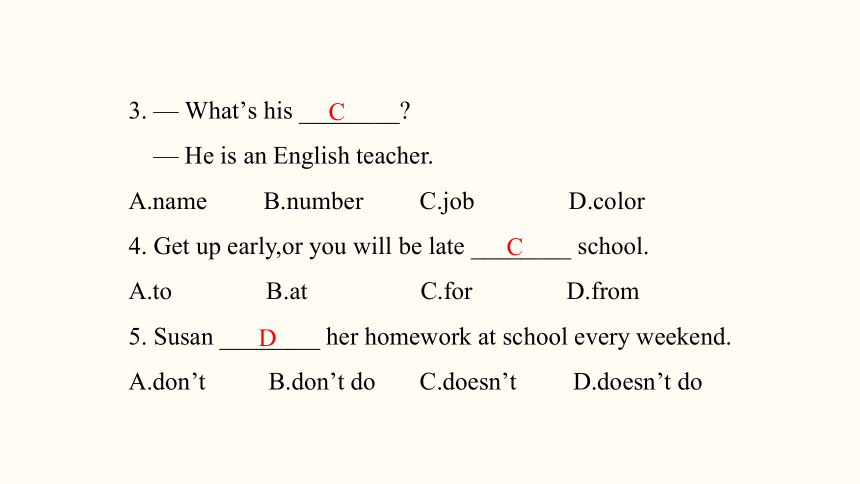Unit 2 What time do you go to school? Section A (Grammar Focus~3c) 课件(共26张PPT) 2023-2024学年人教版英语七年级下
文档属性
| 名称 | Unit 2 What time do you go to school? Section A (Grammar Focus~3c) 课件(共26张PPT) 2023-2024学年人教版英语七年级下 |  | |
| 格式 | pptx | ||
| 文件大小 | 3.3MB | ||
| 资源类型 | 教案 | ||
| 版本资源 | 人教新目标(Go for it)版 | ||
| 科目 | 英语 | ||
| 更新时间 | 2024-01-01 18:07:56 | ||
图片预览









文档简介
(共26张PPT)
Unit 2
What time do you go to school
Section A (Grammar Focus~3c)
新课导入
Free Talk
A: What time is it
B: It’s___________.
A: What time is it
B: It’s ____________.
six o’clock
six-thirty
Look and say
What time do you usually get up
I usually get up at…
What time do you usually run
I usually run at …
Look and say
He usually takes a shower at …
What time does he usually
take a shower
What time does she usually
eat breakfast
She usually eats breakfast at …
1
2
能熟记并能正确运用本课时的重点单词和短语
能正确使用频度副词never, always和usually
3
能熟练谈论自己和他人的日常活动和作息时间
预习检测
1. — ________do you have dinner
— At seven o’clock.
A.What time B.How old
C.How much D.Where
2. — Where shall we eat tonight
— Let’s call Harry. He ________ knows the
best places to go.
A.never B. doesn't C.can't D.always
A
D
3. — What’s his ________
— He is an English teacher.
A.name B.number C.job D.color
4. Get up early,or you will be late ________ school.
A.to B.at C.for D.from
5. Susan ________ her homework at school every weekend.
A.don’t B.don’t do C.doesn’t D.doesn’t do
C
C
D
知识梳理
Language points
time常常和介词“for” 搭配,表示“做……的时间”。
e.g. We don’t have too much time for sports.
我们没有太多时间开展体育活动。
1. That’s a funny time for breakfast!
Language points
2. Adverbs of frequency: 位于行为动词之前,be动词、助动词或情态动词之后
(1) always总是;永远。语气最强,指在一切时候,没有例外。 always与进行时态连用,用于完成时,表示“一向;始终”。
I like English very much. I will always work hard at it.
我很喜欢英语,我要一直努力学。
Language points
(2) usually通常;平常。指通常的动作,但是侧重
已经形成的习惯,它是从已经形成的角度来说
明动作,频度仅次always,偶尔有间隔。
e.g. He usually goes to bed at ten o’clock.
他平常10点钟睡觉。
Language points
(3) often常常;经常。不如usually那么频繁,
表示动作重复,中间有间断。
e.g. He is often late for school.
他经常上学迟到。
Language points
(4) never决不;从未。语气最弱,与always意义相反。
通常用于一般现在时,常置于实义动词之前。
e.g. I never drink wine.
我从不喝酒。
探究一
调查他人的日常生活及作息习惯
1. —What time do you usually get up
—I usually get up at six thirty.
2. —What time do they get dressed
—They always get dressed at seven twenty.
3. —What time does Rick eat breakfast
—He eats breakfast at seven o'clock.
4. —When does Scott go to work
—He always goes to work at eleven o'clock.
He's never late.
5. —When do your friends exercise
—They usually exercise on weekends.
Grammar Focus
阅读下列句子完成后面习题。
3a Write answers or questions. Use always, usually or never.
1. What time do you get up on school days
_______________________________
2. ______________________________?
Rick always gets up at 6:20.
3. What time do you have breakfast
_______________________________
4. _______________________________?
Anna never eats breakfast.
5. What time does your best friend go to school
_________________________________
1. What time do you get up on school days
_______________________________
2. ______________________________
Rick always gets up at 6:20.
3. What time do you have breakfast
___________________________________
4. _______________________________?
Anna never eats breakfast.
5. What time does your best friend go to school
_______________________________
I usually get up at seven o’clock.
What time does Anna eat breakfast
She usually goes to school at six forty.
What time does Rick get up
I usually have breakfast at eight o’clock.
Answers
3b Write about something you always do, something
you usually do and something you never do.
Always __________________
__________________
usually _________________
__________________
never ____________________
__________________
Words Sentences
Always I always have breakfast at 6:25.
I always go to school at seven o’clock.
Usually I usually have lunch at school.
I usually play the guitar at 6:00 p.m.
Never I am never late for school.
I never watch TV on school days.
Group work
3c Interview three of your classmates. Find out what
time they do these activities.
Student 1 Name: ___ Student 2 Name: ___ Student 3
Name: ___
get up on weekends
exercise
eat dinner
take a shower
go to school
In our group, Jenny usually gets up late on weekends.
She gets up at …
____________________________________
____________________________________
____________________________________
____________________________________
____________________________________
seven o’clock. She always exercises at eight
o’clock. She usually eats dinner at six thirty.
She usually goes to school at seven thirty on
school days.
She usually takes a shower at nine o’clock.
In our group, S1… S2… S3…
Give a report to the class.
Group work
当堂检测见DCF课件
活动小结
通过以上的活动可知,对作息时间提问用1.___________ 或者 2.___________;具体的时刻前面要用介词3._____________;其回答通常用4.___________、___________和___________等副词。
what time
when
at
always usually never
探究二
重点短语的运用
“火眼金睛”
请找出本课时中所学过的重点短语。
get up
get dressed
go to school
take a shower
have breakfast
brush teeth
……
“连连看”
get up
get dressed
go to school
take a shower
have breakfast
brush teeth
“你点我说”
一名学生随机抽出一个短语,另一个学生造句并抽出下一个短语;
go to school
have breakfast
They go to school by bike.
... have breakfast...
当堂检测见DCF课件
活动小结
通过以上的活动,我们可以知道,“起床”的
表达为1.______________;“穿衣服”的表达为2.______________;“洗澡,淋浴”的表达为3.______________;“去上学”的表达为4.______________。
get up
get dressed
take a shower
go to school
当堂检测
1. Mary's father goes to work at seven.(改为一般疑问句)
Mary's father to work at seven
2. My sister gets up early.(改为否定句)
My sister up early.
3. When do you usually have dinner (改为同义句)
do you usually have dinner
4. Alan's favorite show is from 8:30 p.m. to 10:00 p.m.
(对画线部分提问)
is Alan's favorite show
5. I play ping-pong after school.(对画线部分提问)
you play ping-pong
按要求完成下列句子。
Does go
doesn’t get
What time
What time
When do
课堂总结
调查他人的日常生活及作息习惯
重点短语的运用
Unit 2 Section A
(Grammar Focus~3c)
Unit 2
What time do you go to school
Section A (Grammar Focus~3c)
新课导入
Free Talk
A: What time is it
B: It’s___________.
A: What time is it
B: It’s ____________.
six o’clock
six-thirty
Look and say
What time do you usually get up
I usually get up at…
What time do you usually run
I usually run at …
Look and say
He usually takes a shower at …
What time does he usually
take a shower
What time does she usually
eat breakfast
She usually eats breakfast at …
1
2
能熟记并能正确运用本课时的重点单词和短语
能正确使用频度副词never, always和usually
3
能熟练谈论自己和他人的日常活动和作息时间
预习检测
1. — ________do you have dinner
— At seven o’clock.
A.What time B.How old
C.How much D.Where
2. — Where shall we eat tonight
— Let’s call Harry. He ________ knows the
best places to go.
A.never B. doesn't C.can't D.always
A
D
3. — What’s his ________
— He is an English teacher.
A.name B.number C.job D.color
4. Get up early,or you will be late ________ school.
A.to B.at C.for D.from
5. Susan ________ her homework at school every weekend.
A.don’t B.don’t do C.doesn’t D.doesn’t do
C
C
D
知识梳理
Language points
time常常和介词“for” 搭配,表示“做……的时间”。
e.g. We don’t have too much time for sports.
我们没有太多时间开展体育活动。
1. That’s a funny time for breakfast!
Language points
2. Adverbs of frequency: 位于行为动词之前,be动词、助动词或情态动词之后
(1) always总是;永远。语气最强,指在一切时候,没有例外。 always与进行时态连用,用于完成时,表示“一向;始终”。
I like English very much. I will always work hard at it.
我很喜欢英语,我要一直努力学。
Language points
(2) usually通常;平常。指通常的动作,但是侧重
已经形成的习惯,它是从已经形成的角度来说
明动作,频度仅次always,偶尔有间隔。
e.g. He usually goes to bed at ten o’clock.
他平常10点钟睡觉。
Language points
(3) often常常;经常。不如usually那么频繁,
表示动作重复,中间有间断。
e.g. He is often late for school.
他经常上学迟到。
Language points
(4) never决不;从未。语气最弱,与always意义相反。
通常用于一般现在时,常置于实义动词之前。
e.g. I never drink wine.
我从不喝酒。
探究一
调查他人的日常生活及作息习惯
1. —What time do you usually get up
—I usually get up at six thirty.
2. —What time do they get dressed
—They always get dressed at seven twenty.
3. —What time does Rick eat breakfast
—He eats breakfast at seven o'clock.
4. —When does Scott go to work
—He always goes to work at eleven o'clock.
He's never late.
5. —When do your friends exercise
—They usually exercise on weekends.
Grammar Focus
阅读下列句子完成后面习题。
3a Write answers or questions. Use always, usually or never.
1. What time do you get up on school days
_______________________________
2. ______________________________?
Rick always gets up at 6:20.
3. What time do you have breakfast
_______________________________
4. _______________________________?
Anna never eats breakfast.
5. What time does your best friend go to school
_________________________________
1. What time do you get up on school days
_______________________________
2. ______________________________
Rick always gets up at 6:20.
3. What time do you have breakfast
___________________________________
4. _______________________________?
Anna never eats breakfast.
5. What time does your best friend go to school
_______________________________
I usually get up at seven o’clock.
What time does Anna eat breakfast
She usually goes to school at six forty.
What time does Rick get up
I usually have breakfast at eight o’clock.
Answers
3b Write about something you always do, something
you usually do and something you never do.
Always __________________
__________________
usually _________________
__________________
never ____________________
__________________
Words Sentences
Always I always have breakfast at 6:25.
I always go to school at seven o’clock.
Usually I usually have lunch at school.
I usually play the guitar at 6:00 p.m.
Never I am never late for school.
I never watch TV on school days.
Group work
3c Interview three of your classmates. Find out what
time they do these activities.
Student 1 Name: ___ Student 2 Name: ___ Student 3
Name: ___
get up on weekends
exercise
eat dinner
take a shower
go to school
In our group, Jenny usually gets up late on weekends.
She gets up at …
____________________________________
____________________________________
____________________________________
____________________________________
____________________________________
seven o’clock. She always exercises at eight
o’clock. She usually eats dinner at six thirty.
She usually goes to school at seven thirty on
school days.
She usually takes a shower at nine o’clock.
In our group, S1… S2… S3…
Give a report to the class.
Group work
当堂检测见DCF课件
活动小结
通过以上的活动可知,对作息时间提问用1.___________ 或者 2.___________;具体的时刻前面要用介词3._____________;其回答通常用4.___________、___________和___________等副词。
what time
when
at
always usually never
探究二
重点短语的运用
“火眼金睛”
请找出本课时中所学过的重点短语。
get up
get dressed
go to school
take a shower
have breakfast
brush teeth
……
“连连看”
get up
get dressed
go to school
take a shower
have breakfast
brush teeth
“你点我说”
一名学生随机抽出一个短语,另一个学生造句并抽出下一个短语;
go to school
have breakfast
They go to school by bike.
... have breakfast...
当堂检测见DCF课件
活动小结
通过以上的活动,我们可以知道,“起床”的
表达为1.______________;“穿衣服”的表达为2.______________;“洗澡,淋浴”的表达为3.______________;“去上学”的表达为4.______________。
get up
get dressed
take a shower
go to school
当堂检测
1. Mary's father goes to work at seven.(改为一般疑问句)
Mary's father to work at seven
2. My sister gets up early.(改为否定句)
My sister up early.
3. When do you usually have dinner (改为同义句)
do you usually have dinner
4. Alan's favorite show is from 8:30 p.m. to 10:00 p.m.
(对画线部分提问)
is Alan's favorite show
5. I play ping-pong after school.(对画线部分提问)
you play ping-pong
按要求完成下列句子。
Does go
doesn’t get
What time
What time
When do
课堂总结
调查他人的日常生活及作息习惯
重点短语的运用
Unit 2 Section A
(Grammar Focus~3c)
同课章节目录
- Unit 1 Can you play the guitar?
- Section A
- Section B
- Unit 2 What time do you go to school?
- Section A
- Section B
- Unit 3 How do you get to school?
- Section A
- Section B
- Unit 4 Don't eat in class.
- Section A
- Section B
- Unit 5 Why do you like pandas?
- Section A
- Section B
- Unit 6 I'm watching TV.
- Section A
- Section B
- Review of Units 1-6
- Unit 7 It's raining!
- Section A
- Section B
- Unit 8 Is there a post office near here?
- Section A
- Section B
- Unit 9 What does he look like?
- Section A
- Section B
- Unit 10 I'd like some noodles.
- Section A
- Section B
- Unit 11 How was your school trip?
- Section A
- Section B
- Unit 12 What did you do last weekend?
- Section A
- Section B
